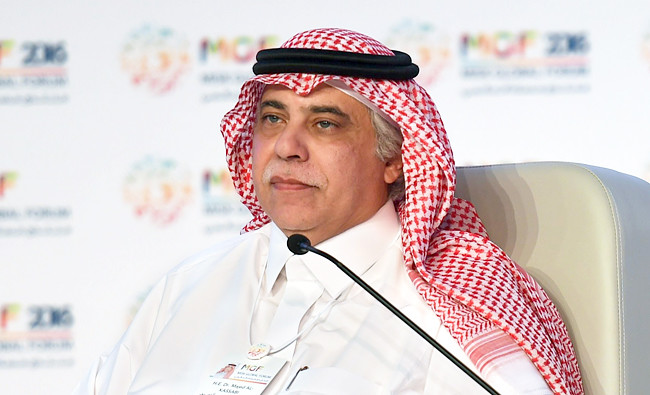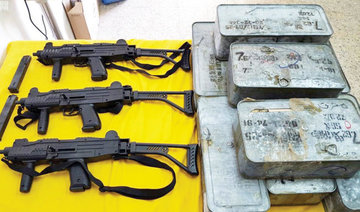RIYADH: Saudi Arabia may allow foreigners to invest in self-employed professions in return for paying taxes at an estimated annual rate of 20 percent in a bid to curb commercial cover-up, Al-Eqtisadiah daily reported.
Saudi authorities are reportedly studying procedures of imposing taxes of two types. One would be in the form of financial statements provided by a foreigner in terms of revenues, expenses and profits, the daily said. The second form of tax will be imposed on estimated profits for certain professions in which profits cannot be easily verified such as the contracting sector, which will run to 15 percent, while the rate of tax on consulting professions may go to 25 percent, the daily said.
The new procedures will treat foreigners as investors in self-employed professions without the need to have sponsors after having obtained the required licenses in areas such as workshops, groceries and contracting.
The new drive comes in conformity with statements made by Minister of Commerce Majid Al-Qassabi on the sidelines of the opening of the parallel market (Nomu) last month where he said commercial cover-up is an unhealthy phenomenon and harmful to the nation’s economy.
He said his ministry has developed a study on the causes and solutions for commercial cover-up, including allowing foreigners to invest within certain regulations, and payment of tax without need to conceal their activities.
Last month, the commerce minister called for the elimination of commercial cover-up to improve the national economy and create new jobs for Saudis.
Addressing a workshop, the minister emphasized that anti-commercial concealment is an important and vital issue to improve the economy and to create new jobs. Consequently, he said, it was one of the most important initiatives of the ministry in the National Transformation Program (NTP) 2020.
Foreigners may be allowed to invest in taxed jobs
Foreigners may be allowed to invest in taxed jobs

NEXTG3N Hackathon: Shaping future skills through Web3, gaming

- Event gathered international, Saudi innovators in Riyadh
- The event was spearheaded by Princess Nourah Al-Faisal, founder and CEO of Adhlal, in collaboration with W3 ff Venture Builder
RIYADH: As the world rapidly evolves, projections indicate that 65 percent of future jobs are yet to be created. Hence, Saudi Arabia is proactively preparing its youth for this dynamic landscape.
The NEXTG3N Hackathon, which which started Jan. 9 and ends Jan. 11 at Princess Nourah University in Riyadh, gathered international innovators alongside Saudi talent to develop groundbreaking solutions at the crossroads of Web3 and gaming.
The event was spearheaded by Princess Nourah Al-Faisal, founder and CEO of Adhlal, in collaboration with W3 ff Venture Builder.
Participants were invited to create practical solutions that addressed critical areas such as education, digital inclusion, and emerging technologies.
This initiative aimed at empowering the next generation with the skills and knowledge necessary to thrive in a world increasingly influenced by technological advances.
The hackathon leveraged Web3’s decentralized framework and gaming’s engaging approach to address the critical challenge of preparing the next generation for an uncertain job market.
Selected innovations from the hackathon will be showcased at the World Economic Forum in Davos, highlighting Saudi Arabia’s growing influence in the global digital and creative landscape.
This initiative aligns with Saudi Vision 2030’s goals, creating a platform from which Saudi youngsters collaborate with global innovators to tackle shared challenges and shape the future of work.
The first day of the event featured an impressive lineup of speakers who are pioneers in their respective fields. Among them were Princess Nourah; Hamad Al-Owaishiq, founder and CEO of the Saudi Youth Society; Tanja Ludwig from W3 ff Venture Builder in Germany; Dalia Samra-Rohte from the Algemeine Handels Kamer; and Xavier Prost from Veridos UAE, one of the event’s sponsors.
Princess Nourah spoke of the importance of creating a safe online environment for children through Web3 technology. She highlighted how blockchain can provide a secure space for young users, fostering their engagement with digital platforms. She introduced Adhlal as a research-based community and design consultancy focused on innovation and creativity in design.
Princess Nourah remarked on the significance of soft skills in preparing the youth for future challenges, and added: “When we think about the evolving landscape over the next few years, we must consider how to foster innovation and creativity among youth.”
Al-Owaishiq said: “Web3 is the focus of the current global discourse, and it’s crucial for young people to be aware of this paradigm shift. They need to develop skills that allow them to engage with Web3 technology creatively and innovatively.”
His emphasis on youth empowerment underscored the hackathon’s goal of equipping participants with the tools to navigate and lead within the new digital landscape.
Sabrina Goerlich, a Web3 consultant, emphasized the vision behind NEXTG3N, saying: “Our objective is to create a safe, hybrid space that utilizes technologies like blockchain and Web3 to empower the younger generation. We aim to cultivate tomorrow’s architects of change.”
She noted that the collaboration with W3 ff Venture Builder brought both technological and business perspectives, enhancing the overall impact of the initiative.
The NEXTG3N Hackathon represented a strategic effort to harness creativity and technology for the betterment of society. By bringing together diverse talents, the event sought to inspire participants to develop solutions that addressed real-world challenges, while fostering a culture of innovation.
As Saudi Arabia continues to invest in the future of its youngsters, events like the NEXTG3N Hackathon highlight the nation’s commitment to preparing its workforce for the jobs of tomorrow.
By focusing on Web3 and gaming, the hackathon aimed to equip participants with essential skills, ensuring they are not only consumers of technology but also innovators and leaders in the digital economy.
Tuwaiq Academy opens registration for cybersecurity bootcamp

- Scheduled to begin on Feb. 16, 2025, the five-month bootcamp will be held at the academy’s headquarters in Riyadh
- The program aims to cultivate exceptional national talent in diverse cybersecurity domains
RIYADH: Tuwaiq Academy has opened registration for the Tuwaiq Cybersecurity Bootcamp, a program offering employment opportunities to top-performing participants.
Scheduled to begin on Feb. 16, 2025, the five-month bootcamp will be held at the academy’s headquarters in Riyadh.
The program aims to cultivate exceptional national talent in diverse cybersecurity domains, providing participants with the opportunity to earn professional certifications in collaboration with OffSec.
The Tuwaiq Cybersecurity Bootcamp provides participants with the opportunity to earn the Security Operations Center-200 professional certification, which equips them with critical skills for SOC operations, including advanced system defense techniques and strategies to mitigate cyber threats.
The program also offers a chance to obtain the PEN-200 professional certification, focused on building expertise in advanced penetration testing.
The academy has opened registration for the Tuwaiq Cybersecurity Bootcamp, along with over 150 professional camps and programs, available through its website: https://tuwaiq.edu.sa
Tuwaiq Academy CEO Abdulaziz Al-Hammadi highlighted the academy’s dedication to cultivating outstanding national talent in cybersecurity.
This commitment is reflected in its professional boot camps and programs conducted in collaboration with leading international organizations.
Additionally, the academy partners with government and private sector entities to create job opportunities for its graduates. Ninety percent of participants in previous Tuwaiq Cybersecurity Bootcamp were employed within three months of graduation.
Tuwaiq Academy is the first specialized institution dedicated to cultivating national talent in advanced technology.
Through partnerships with global companies such as Apple, Meta, Microsoft, Google, IBM, and Amazon, the academy offers a range of professional boot camps.
The initiative is designed to bridge the gap between the rapid evolution of modern technologies and the needs of the labor market.
Parliamentary Foreign Vice-Minister Matsumoto to visit Saudi Arabia, Jordan

TOKYO: Japan’s Parliamentary Vice-Minister for Foreign Affairs Matsumoto Hisashi will visit the Kingdom of Saudi Arabia and Jordan from Jan. 11 to 15, the foreign ministry said on Friday.
During the visit, Matsumoto is scheduled to exchange views with government officials of Saudi Arabia and Jordan on bilateral relations as well as regional and international situations.
Matsumoto is scheduled to arrive in Riyadh on Jan. 12, according to the ministry.
A version of this article appeared on Arab News Japan.
Thousands in Lebanon benefit from KSrelief healthcare services

RIYADH: A project by Saudi aid agency KSrelief to improve healthcare services for Syrian refugees and their host community in Bebnine, Akkar Governorate, has continued in Lebanon.
Some 2,689 patients were seen at the Akkar-Bebnine Health Care Center in December with 6,194 services provided under pharmacy, laboratory, nursing, community and psychological health programs.
Of the total number of patients, 68 percent were women and 51 percent were refugees, reported the Saudi Press Agency.
Saudi Arabia’s KSrelief continues aid work in new year

- The work reflects Saudi Arabia's ongoing commitment through KSrelief to help those most in need
RIYADH: The Kingdom’s aid agency KSrelief has continued its humanitarian work at the start of 2025, the Saudi Press Agency reported recently.
In Syria, 892 families received food aid and health kits in the Afrin and Aleppo governorates of the war-torn country, benefiting 5,352 individuals.
The agency also distributed bags of flour, winter kits, and personal-care bags to 211 families in Syria’s Al-Rastan area, benefitting 968 individuals.
In Syria’s Rural Damascus governorate, KSrelief distributed bags of flour, food aid, personal-care bags, and shelter kits to 164 families.
In Pakistan, there were 2,821 food parcels, benefiting 18,638 people, distributed in the Bahawalnagar and Rahim Yar Khan areas of Punjab province, and the Hingol area in Khyber Pakhtunkhwa province.
KSrelief also distributed 1,082 clothing vouchers to families in Palestinian refugee camps in Jordan’s Amman, Zarqa and Balqa governorates.





















